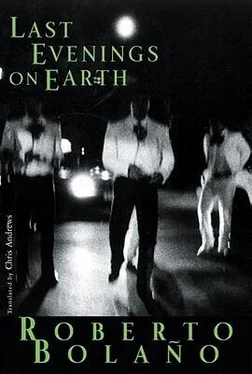At first I thought of sending Miranda my poem, but after much hesitation and soul-searching I decided not to. I must be going mad, I thought: if I sent her that poem, there'd be no more letters from Sensini, and who could blame him? So I didn't send it. For a while I applied myself to the search for new literary prizes. In one of his letters Sensini said he was worried that he might have run his race. I misunderstood; I thought he meant he was running out of competitions to enter.
I wrote back to say they must come to Girona; he and Carmela were most welcome to stay at my house. I even spent several days cleaning, sweeping, mopping, and dusting, having convinced myself (quite unreasonably) that they might turn up at any moment, with Miranda. Since they had one free pass they'd only have to buy two tickets, and Catalonia, I stressed, was full of wonderful things to see and do. I mentioned Barcelona, Olot, the Costa Brava, and talked about the happy days we could spend together. In a long reply, thanking me for my invitation, Sensini said that for the moment they couldn't leave Madrid. Unlike any of the preceding letters, this one was rather confused, although in the middle he returned to the theme of prizes (I think he had won another one) and encouraged me not to give up, to keep on trying. He also said something about the writer's trade or profession, and I had the impression that his words were meant partly for me and partly for himself, as a kind of reminder. The rest, as I said, was a muddle. When I got to the end I had the feeling that someone in his family wasn't well.
Two or three months later Sensini wrote to tell me that one of the bodies in a recently discovered mass grave was probably Gregorios. His letter was restrained. There was no outpouring of grief; all he said was that on a certain day, at a certain time, a group of forensic pathologists and officials from human rights organizations had opened a mass grave containing the bodies of more than fifty young people, etc. For the first time, I didn't want to reply in writing. I would have liked to call him, but I don't think he had a telephone, and if he did I didn't know his number. My letter was brief. I said I was sorry, and ventured to point out that they still didn't know for sure that the body was Gregorios.
Summer came and I took a job in a hotel on the coast. In Madrid that summer there were numerous lectures, courses, and all sorts of cultural activities, but Sensini didn't participate in any of them, or if he did, it wasn't mentioned in the newspaper I was reading.
At the end of August I sent him a card. I said that maybe when the season was over I would visit him. That was all. When I got back to Girona in the middle of September, in the small pile of letters slipped under the door, I found one from Sensini dated August seventh. He had written to say good-bye. He was going back to Argentina; with the return of democracy he would be safe now, so there was no point staying away any longer. And it was the only way he would be able to find out for sure what had happened to Gregorio. Carmela, of course, is returning with me, he said, but Miranda will stay. I wrote to him immediately, at the only address I had, but received no reply.
Gradually I came to accept that Sensini had gone back to Argentina for good and that, unless he wrote to me again, our correspondence had come to an end. I waited a long time for a letter from him, or so it seems to me now, looking back. The letter, of course, never came. I tried to tell myself that life in Buenos Aires must be hectic, an explosion of activity, hardly time to breathe or blink. I wrote to him again at the Madrid address, hoping that the letter would be sent on to Miranda, but a month later it was returned to me stamped "Addressee Unknown." So I gave up and let the days go by and gradually forgot about Sensini, although on my rare visits to Barcelona I would sometimes spend whole afternoons in secondhand bookshops looking for his other books, the ones I knew by their titles but was destined never to read. All I could find in the shops were old copies of Ugarte and the collection of stories published in Barcelona by a company that had recently gone into receivership, as if to send a message to Sensini (and to me).
A year or two later I found out that he had died. I think I read it in a newspaper, I don't know which one. Or maybe I didn't read it; maybe someone told me, but I can't remember talking around that time with anyone who knew him, so I probably did read the death notice somewhere. It was brief, as I remember it: the Argentinean writer Luis Antonio Sensini, who lived for several years in exile in Spain, had died in Buenos Aires. I think there was also a mention of Ugarte at the end. I don't know why, but it didn't come as a surprise. I don't know why, but it seemed logical that Sensini would go back to Buenos Aires to die.
Some time later, when the photo of Sensini, Carmela, and Miranda and the photocopied image of Gregorio were packed away with my other memories in a cardboard box that I still haven't committed to the flames for reasons I prefer not to expand upon here, there was a knock on my door. It must have been about midnight, but I was awake. It gave me a shock all the same. I knew only a few people in Girona and none of them would have turned up like that unless something out of the ordinary had happened. When I opened the door there was a woman with long hair, wearing a big black overcoat. It was Miranda Sensini, although she had changed a good deal in the years since her father had sent me the photo. Next to her was a tall young man with long blond hair and an aquiline nose. I'm Miranda Sensini, she said to me with a smile. I know, I said, and invited them in. They were on their way to Italy; after that they planned to cross the Adriatic to Greece. Since they didn't have much money they were hitchhiking. They slept in my house that night. I made them something to eat. The young man was called Sebastian Cohen, and he had been born in Argentina too, although he had lived in Madrid since he was a child. He helped me prepare the meal while Miranda looked around the house. Have you known her for long? he asked. Until a moment ago, I'd only seen her in a photo, I replied.
After dinner, I set them up in one of the rooms and said they could go to bed whenever they wanted. I thought about going to bed myself, but realized it would be hard, if not impossible, to sleep, so I gave them a while to get settled, then went downstairs and put on the television with the volume down low and sat there thinking about Sensini.
Soon I heard someone on the stairs. It was Miranda. She couldn't get to sleep either. She sat down beside me and asked for a cigarette. At first we talked about their trip, Girona (they had been in the city all day, but I didn't ask why they had come to my house so late), and the cities they were planning to visit in Italy. Then we talked about her father and her brother. According to Miranda, Sensini never got over Gregorios death. He went back to look for him, although we all knew he was dead. Carmela too? I asked. He was the only one who hadn't accepted it, she said. I asked her how things had gone in Argentina. Same as here, same as in Madrid, said Miranda, same as everywhere. But he was well-known and loved in Argentina, I said. Same as here, she said. I got a bottle of cognac from the kitchen and offered her a drink. You're crying, she said. When I looked at her she turned away. Were you writing? she asked. No, I was watching TV. No, I mean when we arrived. Yes, I said. Stories? No, poems. Ah, said Miranda. For a long time we sat there drinking in silence, watching the black and white images on the television screen. Tell me something, I said, Why did your father choose the name Gregorio? Because of Kafka, of course, said Miranda. Gregor Samsa? Of course, she said. I thought so, I said. Then Miranda told me the story of Sensini's last months in Buenos Aires.
Читать дальше












